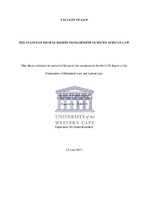| dc.contributor.advisor | Koornhof, Pieter | |
| dc.contributor.author | Wrensch, Jesse-Lee James | |
| dc.date.accessioned | 2018-06-28T11:02:57Z | |
| dc.date.available | 2018-08-31T22:10:06Z | |
| dc.date.issued | 2017 | |
| dc.identifier.uri | http://hdl.handle.net/11394/6087 | |
| dc.description | Magister Legum - LLM (Mercantile and Labour Law) | |
| dc.description.abstract | It is justifiable for the holder of copyright to be entitled to its protection and to be granted the
exclusive right to profit from their innovation, and this is the basis for the development of laws
promoting intellectual property rights. Accordingly, the principle of allowing for copyright
protection is more than justifiable. Modern copyright is traditionally defined as the right that a creator has in their literary or artistic
works. These types of works include computer programmes, films, books and music. Modern
copyright protection finds its origins in the Berne Convention of 1886 which provided authors
with a standardised means to control how their works are used, by whom they are used and on
what terms they can be used. All countries who are signatories to the Berne Convention, like
South Africa, are required to provide its Copyright holders with a minimum degree of
protection. | |
| dc.language.iso | en | |
| dc.publisher | University of the Western Cape | |
| dc.title | The Status of Digital Rights Management in South African Law | |
| dc.rights.holder | University of the Western Cape | |

